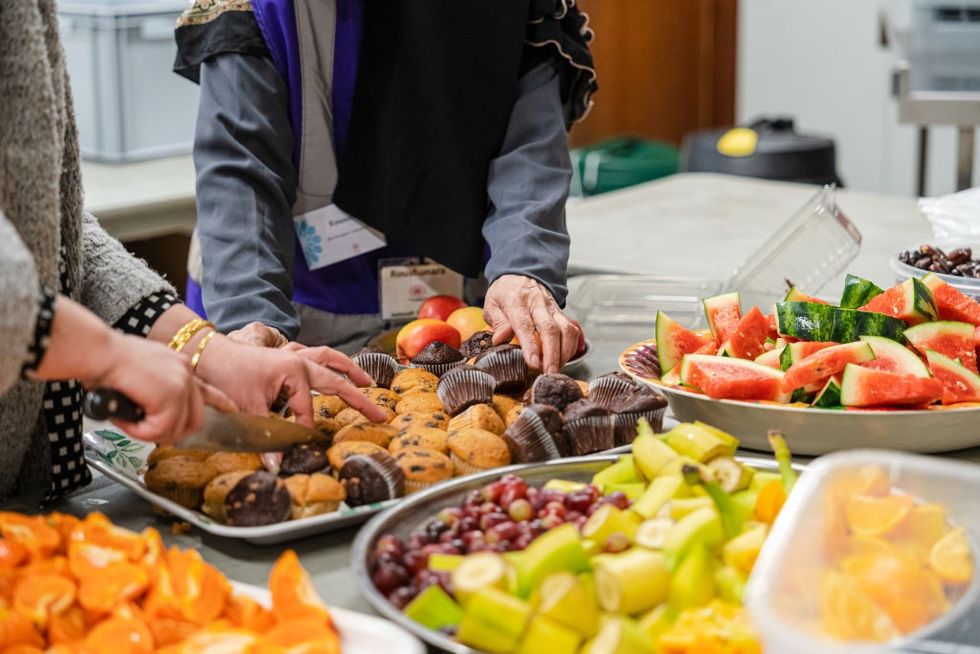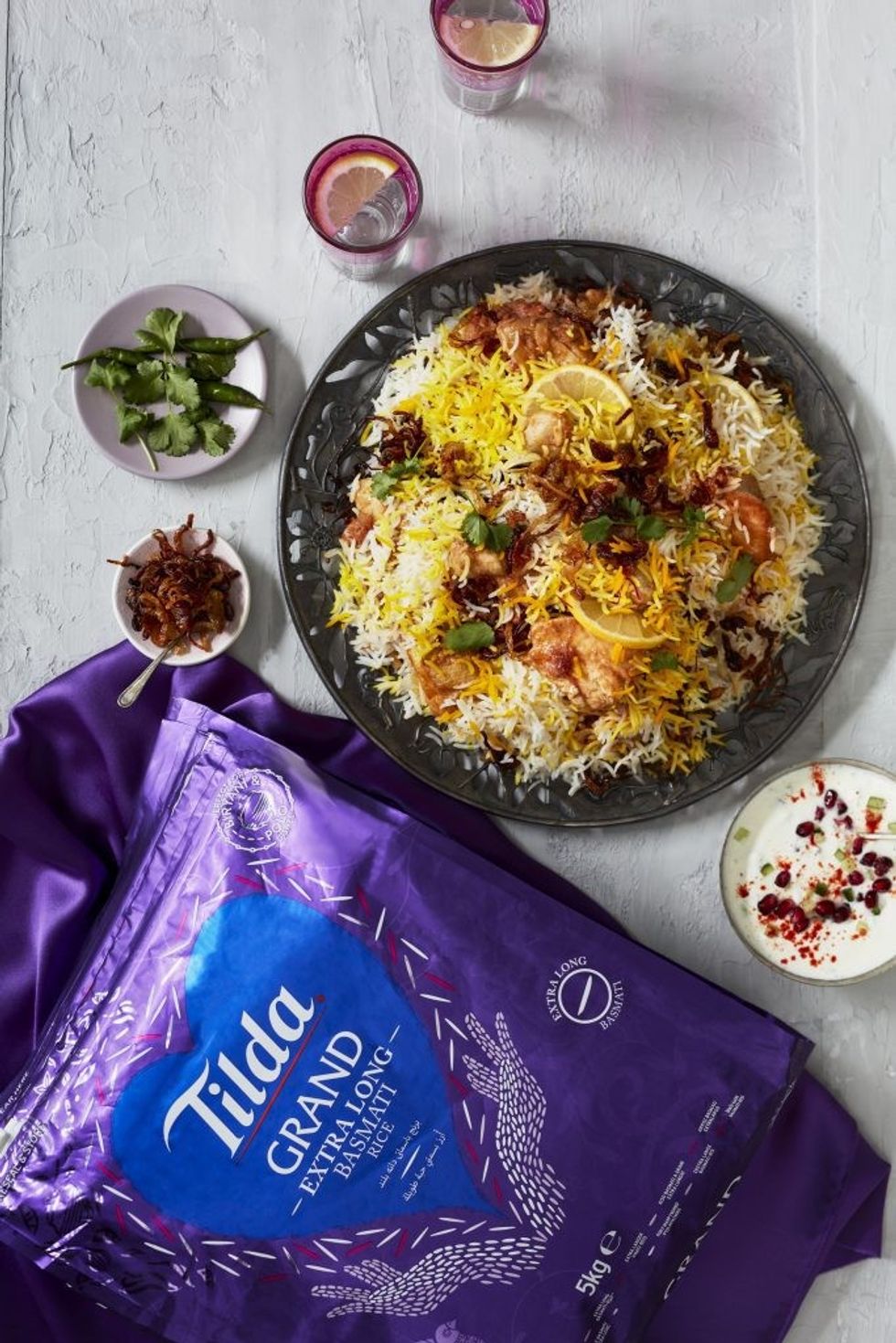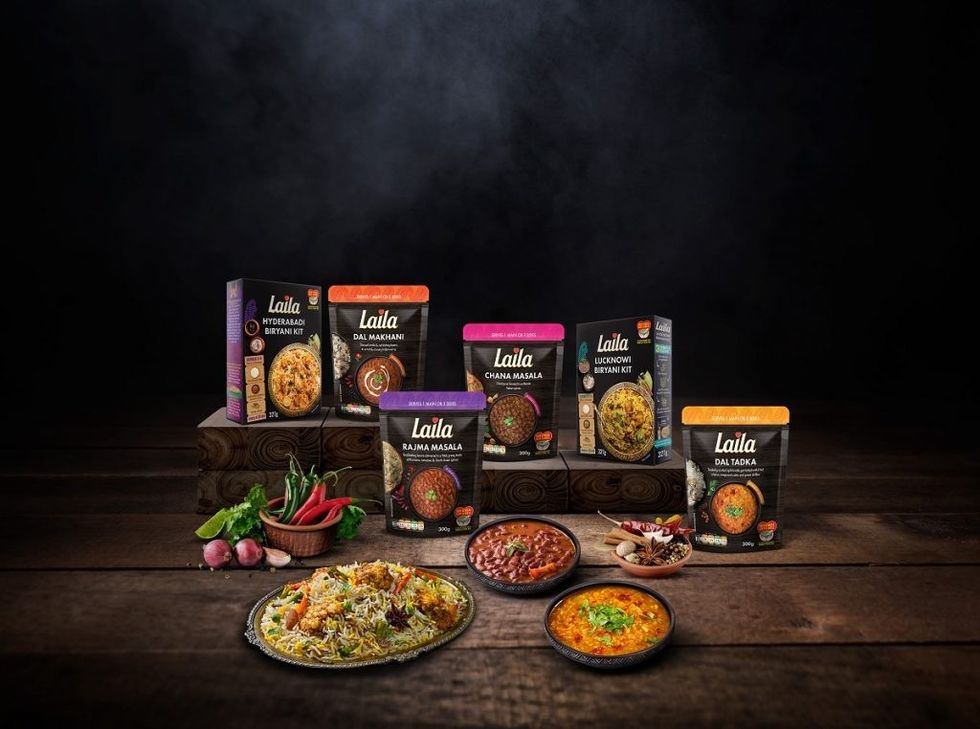Retail markets have been abuzz with activity as British Muslims were on a shopping spree in preparation of Eid al-Fitr, which is being celebrated today (April 21) in the UK, to mark the culmination of the fasting month of Ramadan that began on March 23.
The 30-odd days festival season arrived at a time when the whole retail community has been struggling hard to stay profitable with plummeting sales, while the cost of goods, energy, transport and staff rising phenomenally in the recent months.
The Islamic calendar’s two Eid festivals – Eid al-Fitr (celebrated at Ramadan’s close) and Eid al-Adha (later in the calendar) – usually come with a bonanza for retailers. Eid al-Fitr, also known as smaller Eid, is a three-day-long festival, while Eid al-Adha or greater Eid spans four days of festivities. The first day of Eid also marks the first day of the Islamic month Shawwal.

“The shopping appetite has phenomenally increased among Muslim customers in the recent days,” feels an independent grocer in Blackburn. “The trend can be seen as a precursor to the enhanced retail activity in the days leading up to and immediately following Eid al-Fitr. However, it is vital for retailers [especially independents who are battling for survival] to understand how to better control their stockpiles during the festival as part of an agile strategy to win over customers.”
According to the latest 2021 census, Blackburn with Darwen has a Muslim population of 54,146, which is 35.0 per cent of the population. Other settlements with large number of Muslims include London, Birmingham, Bradford, Luton, Dewsbury, Slough, Leicester, Nottingham, Derby, Manchester and High Wycombe.
Eid is sweeter
Britain is home to around four million Muslims, of whom around three million observe Ramadan fasting.
Eid al-Fitr, the festival of breaking the fast, is dubbed sweet Eid, while Eid al-Adha, the festival of the sacrifice, is known as salty Eid. As the name, sweet Eid, suggests, a variety of sweet dishes form part and parcel of the celebrations.
“The holy month is rooted in faith, culture and tradition, and is dedicated to self-reflection and prayer, after which Muslims celebrate Eid-al-Fitr with family, friends and of course, sumptuous food,” says Ali Akbar, an Indian-origin businessman and a native of Birmingham.
“Following a month of fasting, Muslims enjoy their first daylight meal along with family and friends on an expansive breakfast on Eid day. It is a custom for us to serve a variety of sweet dishes including Baklawa, besan ladoo, vermicelli, halwas, kheer, gulab jamun, barfi, gujiya, cookies, nougat and desserts during the meal.”

Akbar, who lives with family in Digbeth, has already begun his festival shopping to avoid large crowds and the rush of last-minute shoppers. Along with sweets and confectioneries, Akbar buys a lot of food ingredients and flavours for cooking various Eid dishes at home.
Besides this, a wide variety of rice, wheat and flour; dried fruits, dates and nuts; fresh fruits and vegetables, meat and poultry; dairy products; vegetable and sunflower oils; jams and sauces; soft drinks and exotic juices will be of huge demand in the coming days, closer to Eid.
“During special occasions like Eid, people would want to serve the best for their family and friends,” adds Anna Beheshti, head of marketing at Tilda. “Hence, they give even greater importance while choosing the best quality products. Our emphasis has always been to offer a wide range of premium rice products that are well suited to preparing meals during these occasions. With consumers feeling excited about the festival, retailers must make use of this opportunity by ensuring the visibility and availability of a variety of products in their stores.”
Customers will be looking for quality products after fasting – looking to treat themselves, family and friends. Independents must learn to deploy various retail tactics and communication methods to convert the potentiality of festivals like Eid onto their own favour by highlighting quality and value for money messages of various products sold in their stores.
“Good quality and affordable pricing go hand in hand during festivities,” points out Akbar. “Eid is all about celebrating the special occasion with family and friends. This is the time when we pay visits to relatives and friends, offering them sweets and gifts. We always look for the best products to be given as gifts. Also, the dishes are to be served among friends. So, of course, quality comes on top of our mind as we look to buy any products during Eid.”
It has always been a custom for Muslims to buy new clothes, gifts and decorative items for Eid al-Fitr. So, independents must also carry an assortment of gifts and decorative items on their shelves for the discerning customers who come to buy other Eid ensembles.
“Independents must try something fresh and different to eventually attract customers,” informs Kenton Burchell, Trading Director at Bestway Wholesale. “Of course, traditional fare will always be important to stock but unique offerings that are not available in the multiples could be a strong footfall driver. For example, the much-loved Hamdard Rooh Afza is a very popular drink that most multiples don’t stock and is available from Bestway. Independents must understand and act according to the changing shopping patterns of customers.”
The UK’s Ramadan economy, which was worth at least £200 million in 2018, has exponentially grown over the last few years. The retail activity has also significantly increased in the post-pandemic phase. Independents must restrategise themselves to win a major share of this growing market.
Bon appétit
The food and garment sectors, which remain central to the celebrations, receive a growing number of customers across various venues and price points. Although online shopping has become a retail phenomenon, especially after the onset of Covid-19, there are still many customers who prefer to buy items at brick-and-mortar outlets.
“Preparations for Eid festival begin as early as the first week of Ramadan,” states Akbar. “Towards the end of Ramadan, the community tends to stock up on food staples [groceries and ingredients] to cook traditional meals to serve family and guests. Buying food staples usually occurs in the last week of Ramadan to ensure that items are fresh to use. And, my first shopping preference has always been our neighbourhood independent outlets as we know each other well.”
Although multiples are witnessing a remarkable increase in footfalls, traditional stores and independents are receiving a good number of customers, reflecting the diverse tastes and preferences of people from the same community.
“As consumers feel excited about the festival, independents must make the most of this opportunity to ensure the visibility and availability of various products that would cater to Eid customers,” says Beheshti. “Ramadan presents the perfect opportunity to engage with a different set of audience by pushing relevant products whilst supporting the celebration’s values of togetherness and inclusion, which is key for customers.”

“The food categories should be merchandised based on factors like customer trends and preferences, local demographics and competition,” says Ashish Amin, Creative Group Head, Surya Foods. “Companies should also use visual merchandising to attract customers, such as by grouping related items together, using eye-catching displays and placing higher-margin items in more prominent locations.”
Another important factor to consider is leveraging store layout to create a better customer experience, such as having a dedicated fresh or frozen food area or displaying convenience items in an easy-to-navigate space. Additionally, strategic product placement can help increase sales – by, for example, putting breakfast items near the checkout or placing items that customers typically buy together nearby.
“With Ramadan accounting for 43 per cent of rice category sales in 2022 (+three per cent YoY), it is evident that rice is a core ingredient for these celebrations,” explains Beheshti of Tilda. “Among food staples, retailers must strive to stock a range of high-quality rice products for customers celebrating the festival. The right product mix, rack arrangement, price points, retail positioning, offers and discounts, advertisements, etc. drive sales. The independents must work towards making it all in tandem for success in business.”
Brands at play
Targeting customers during the holy month of Ramadan and Eid, food manufacturers like Bestway Wholesale, Dina Foods, Surya Foods, TRS Foods, Tilda, For Aisha and Barr Soft Drinks have come up with a wide range of products.
Festival offerings from Dina Foods include baked goods, savoury snacks and traditional confections. The company recently launched dates coated and filled with chocolates and variety packs of Baklawa to woo Eid customers.
“Retailers should be able to adapt their festival offerings to cater to Eid celebrations especially when the fast is over and people want to treat themselves,” says Souheil Haddad, managing director of Dina Foods. “Dina Foods Baklawa is a hot selling commodity that is being shared among family and friends during the Eid celebrations. Baklawa also comes in an excellent gifting box for our customers during the Eid festival.”
Surya Foods, which is one of the largest importers of authentic world foods to the UK market, has around 54 world food brand lines and over 2500 products in its kitty. This Eid, Surya Foods is offering a wide range of pulses and beans under its popular brand Laila, to cater to the growing demand for healthy plant-based products.
“Consumers are increasingly looking for healthier meal options during the festival month,” feels Ashish Amin, Creative Group Head, Surya Foods. “Recipes featuring ingredients with lower carbs, fewer calories and no added sugar are increasingly popular as people look to balance their diets and wellbeing. Laila Foods has a wide range of pulses and beans to cater to the growing demand for healthy plant-based products.”
Tilda offers a wide range of premium rice products which are well suited to preparing meals for celebrations. The brand saw an increase of 49 per cent in shopper penetration during Ramadan season in 2022 within big-bag formats, and highlights the demand for bulk-buying ahead of Eid.
“Products such as Tilda Grand Extra Long Basmati are particularly relevant for Eid celebrations,” says Beheshti. “It is vital for retailers to consider stocking a range of Tilda products, such as Tilda Pure Basmati, Tilda Grand Extra Long Basmati, Tilda Grand Sella Extra Long Basmati, and Tilda Golden Sella Basmati across a variety of pack sizes, as part of the festival menu.”
For the festival season, the UK’s third largest wholesaler Bestway has initiated a multi-phased promotion strategy running in the lead up to Ramadan, offering market-leading product ranges at unbeatable prices.
“We have expanded our product range and are offering Ramadan essentials through our own brand White Pearl,” adds Burchell, “although White Pearl was launched as a basmati rice brand, it has diversified its offerings by adding ghee, oil, flour, lentils, spices, and canned fruit and vegetables into its product portfolio.”
Barr Soft Drinks’ juice brand Rubicon offers consumers a range of regular and high-sugar juice drinks to cater to different occasions during the festival. The wide range of flavours and formats available in sparkling variants come with a broad appeal with shoppers catering to different tastes amongst family and friends.
“Traditional shoppers will vouch for brands that they know and trust,”avers Adrian Troy, marketing director. “Rubicon shoppers are loyal over celebratory periods. Our inhouse research revealed thataround 92 per cent of our customers are loyal and prefer buying our brand. In addition, new shoppers use events and celebrations as inspiration to try something new.So, Rubicon’s wide range of flavours and formats, available in still and sparkling variants, has a broad appeal with shoppers catering for a number of different tastes.”
For Aisha has been offering a wide range of pouch and tray meals, catering for children and babies up to the age of three. The company’s product range includes wonderful recipes inspired by cultures from around the globe including Jamaican Jerk Chicken, Green Bean and Lamb Curry, Chermoula Chicken, Cambodian Fish & Coconut Curry and Moroccan Chicken Tagine.
“This year retailers should be prepared for a particularly busy period, with the independent sector likely to see a particular uplift in sales,” adds Haddad of Dina Foods. “Independents can operate with speed and offer greater variety than the multiples, providing a welcome platform for innovative suppliers during the festival.”
Independents must keep in mind that Halal food items are an important norm during Muslim festival celebrations.
Eid in the Square
The UK’s Muslim communities organise events offering various family activities during Eid. In cities like London and Birmingham, such events attract thousands of people, enabling them to celebrate the festival together. Eid in the Square, in London’s Trafalgar Square, is held annually on the Saturday following Eid al-Fitr. It usually features live entertainment, stalls, exhibitions, and children's activities.
“We’ve a feast of global food stalls to tempt you with including Indian street food from Mr Bombay, silk road delights from Oshpaz Uzbek Street Food, Venezuelan fayre from Pabellon and Somali treats from Hooyo East,” according to the London government’s website. “The North Terrace will be awash with stalls including Desi Doll Company, Yunus Emre Institute London, Islamic Art Prints, London Muslim Health Network and many more.”
Now in its 18th year, the Mayor (Sadiq Khan] of London’s free, annual festival once again welcomes Londoners and visitors to the capital’s iconic Trafalgar Square to celebrate the end of Ramadan, the holy month of fasting, on April 29.
“Celebrations in London are always a spectacle and this year is no different,” adds Akbar of Birmingham. Preparations are already undergoing for the Mayor of London’s annual festival in the capital’s iconic Trafalgar Square. This year’s theme focuses on family, education, and innovation with an exhilarating line-up of acts on the main stage. Similarly, other municipalities of Birmingham, Blackburn, Luton, Bradford and Dewsbury will also have grand Eid festivities.”
Birmingham is also said to be host to the largest Eid celebration in Europe – the ‘Celebrate Eid’ event – which usually expects 60,000 attendees each year with fairground rides, rodeo bull riding and various tasty food stands.
The East London Mosque will also be holding its own celebration to mark the end of Ramadan. InLeeds, celebrations are spread far and wide as families gather together. Some families travel from Birmingham and Bradford just to come to the Leeds Grand Mosque to celebrate Eid. Edinburgh is host to a variety of Eid celebrations, with parties hosted across the city in parks and mosques.
So, it is celebration time in the UK!







